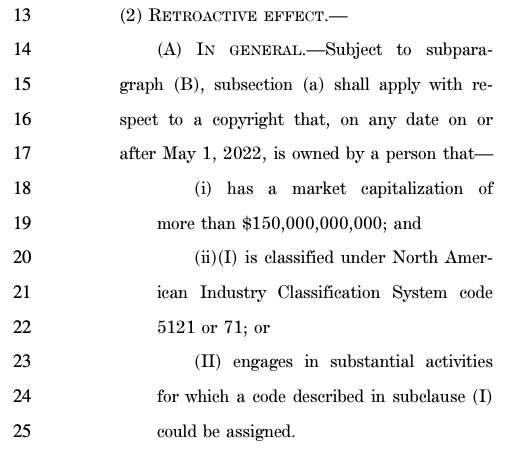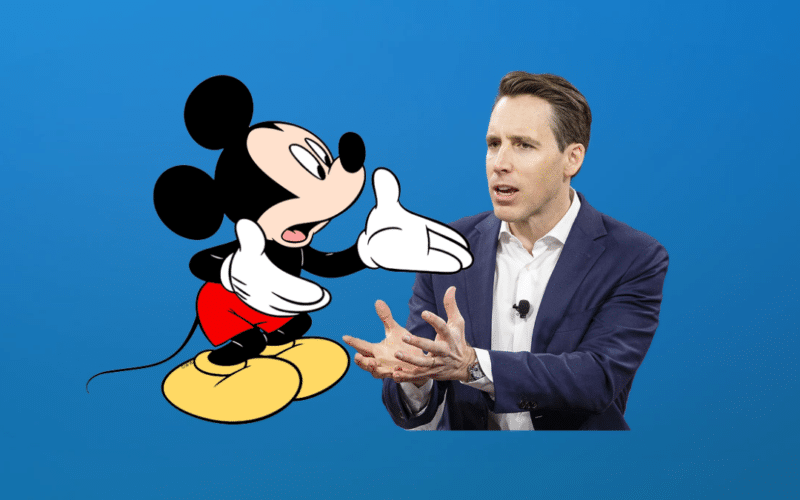Josh Hawley’s proposed copyright legislation is riddled with problems, but you wouldn’t know that from most media reports about the bill.
This week, Missouri Senator Josh Hawley introduced the “Copyright Clause Restoration Act,” aka the “Political Speech Punishment Act,” aka the “Hey, I’m Josh Hawley! Pay Attention to Me! Act.”
Hawley’s proposal is the latest Republican effort to punish The Walt Disney Company after Disney came out against Florida’s so-called “Don’t Say Gay” bill. Hawley’s thinly-disguised attempt to out-DeSantis Ron DeSantis would limit the term of copyright to 56 years going forward, except for the Disney’s, NBCUniversal’s, and MGM’s of the world, which would have many of their copyrights stripped away immediately under the law.

To be clear, this bill is nothing more than performative theater which is not going and never was intended to go anywhere beyond a few fundraising emails. But you’d never know that by the way much of the media reported on Hawley’s legislation this week. While his entire proposal clocks in at two and a half pages and less than 400 words (read here), that didn’t stop dozens of reporters from writing articles about the bill without bothering to read it. Even worse, most of them simply reported Hawley’s talking points as if they were fact, leaving the average reader not only thinking the bill is a legitimate attempt to legislate, but also with a totally skewed sense of what it all actually means.
The good news is that it’s never too late to set the record straight. So, if anyone out there is looking to do a follow-up article that doesn’t consist solely of a regurgitated Josh Hawley press release, here are five topics for your consideration:
1. Disney Doesn’t Have Any “Special Copyright Protections”
“No more handouts for woke corporations,” Hawley’s May 10 tweet announcing his bill declared. “Today I’m introducing legislation to strip @Disney of its special copyright protections.”

And within minutes, reporters and editors dutifully followed the script:

There’s only one problem: Disney doesn’t have any “special copyright protections.” It has the exact same protections as everyone else, which currently consist of a 95-year term of protection. That’s why the 1925 novel “The Great Gatsby” didn’t enter the public domain until 2021. It wasn’t a Disney work. Neither is 1948’s The Babe Ruth Story. That movie is among the worst films I’ve ever seen, but it will be protected for nearly another twenty years.
We certainly can and should have a legitimate discussion about whether copyright terms are too long for everybody, but Disney isn’t subject to any sort of unique, special or “secret” copyright privileges just because they’re Disney.

2. Hawley’s Bill Has Retroactive Effect—But Only for Certain Companies
The media also spent a lot of time this week talking about Steamboat Willie, which is generally considered to be the public debut of the Mickey Mouse character. But Hawley’s bill has nothing to do with forcing that 1928 short film into the public domain. That’s going to happen on January 1, 2024, regardless.
What reporters should have been focused on is the fact Hawley’s bill, if passed, would immediately inject dozens of other works into the public domain years earlier than their copyright terms would otherwise expire. Films like Snow White and the Seven Dwarves, Pinocchio, Cinderella, Mary Poppins and many others would have their (non-special) protections immediately taken away.

There’s no question that Hawley’s legislation is specifically designed to punish Disney. That isn’t a particularly good fact if you’re a “former constitutional professor” trying to avoid passing an unconstitutional bill of attainder. So Hawley acknowledged in an interview that his bill couldn’t legally target only Disney.

But what’s clear is that the bill only targets a very small group of companies that are extremely similar to Disney, in particular large media corporations with market caps of $150 billion or more as of May 1, 2022, that engage in “substantial activities” in the motion picture and arts, entertainment and recreation industries. These companies are also targeted for the bill’s retroactive effect:

Disney obviously qualifies, with a market cap of just over 200 billion as of May 1, but so does Comcast, owner of NBCUniversal ($178B), and likely Amazon and Apple as well. Amazon’s acquisition of MGM’s film library earlier this year would certainly become less valuable if this bill passed. Interestingly, the bill would have applied to Netflix if the market cap threshold had been tied to its stock price last year. But as of May 1, Netflix’s valuation was hovering at around $84 billion, following deep declines in the company’s share price this spring.
While Hawley’s proposed legislation would retroactively limit copyrights owned by the affected companies to 56 years of protection (via two 28-year terms), the copyrights would only be protected for the second term if the company applied for renewal before the end of the first 28-year term.
The problem is that under U.S. Copyright law, there’s been no obligation to affirmatively file renewal applications, even for older works subject to the 1909 Copyright Act, since 1992. This means that works created from 1966 all the way up through 1994 that are currently owned by one of the targeted companies could immediately fall into the public domain under Hawley’s bill unless the owner happened to have already filed a renewal application (which wasn’t necessary). So, as a practical matter, the affected works could extend way beyond Mickey Mouse, Disney, and 1960s-era works, notwithstanding the media headlines.
3. The Bill is Probably Unconstitutional
Given the number of times mainstream media outlets have touted Josh Hawley’s credentials as a “constitutional lawyer,” you’d think they’d be interested in exploring whether or not his proposed legislation is actually constitutional.
It almost certainly isn’t.

For starters, the stated purpose of the bill is to punish Disney for speaking out against homophobic legislation. Put another way, it’s an elected official’s use of legislation to target the content of speech he doesn’t like.
Then there’s the fact that Hawley has also admitted that his proposal is designed (in the words of the headline to his own press release) to “Strip Disney of Special Copyright Protections.” As I noted earlier, legislation that singles out a specific individual, company or group for punishment is an unconstitutional “bill of attainder.”

Finally, there’s the question of whether a copyright qualifies as a property interest that the government isn’t permitted to take away without just compensation. The issue isn’t entirely settled, but if so, retroactively stripping copyright protection would violate the Takings Clause of the Fifth Amendment to the U.S. Constitution. Last year in Cedar Point Nursery v. Hassid, the Supreme Court’s conservative majority took a pretty broad view of the clause, and given that Hawley’s bill would destroy all economic value of the affected copyrights, it’s a decent bet that it would be deemed unconstitutional for this reason as well.
4. Hawley’s Bill Would Cut Off Copyright Termination Rights for Authors and their Heirs
As I’ve discussed here many times, the copyright extensions Congress granted to existing copyrights in 1976 (19 years) and 1998 (an additional 20 years) also came with the ability for authors and their heirs to recapture those additional years of protection via the Copyright Act’s termination provisions. For example, if the author of a work from 1966 had assigned the copyright in that work to Disney, the author (if still living) or his/her heirs would now be eligible to recapture the copyright for the remainder of its term. Termination rights only belong to individuals, not corporations.
Hawley’s proposal to retroactively strip Disney and similarly situated “woke” companies of their copyrights would also effectively strip away the termination rights granted to individuals under the 1976 Copyright Act, by injecting the works into the public domain prior to termination.
5. Hello Formalities and Goodbye International Relations
Josh Hawley’s copyright bill wants to party like it’s 1909, and that doesn’t just mean reducing the length of copyright protection to 56 years. It also means re-introducing draconian requirements for maintaining copyright protection in the first place.
Under the 1909 Act, copyright protection, once secured, could be lost in any number of ways, including the failure to comply with registration, notice and renewal requirements. Slowly but surely, most of the required formalities were removed, with registration made optional in 1976, the notice requirement removed in 1989, and the introduction of automatic renewal in 1992. For newer copyrights (any works of authorship fixed on or after January 1, 1978), there’s a single term of protection, which means renewal has become a relic of the past.
Whatever you think of shorter copyright terms in general, Hawley’s proposed legislation introduces all sorts of complexities back into the copyright regime. Copyright protection would last for 28 years “from the date it was originally secured.” Does that mean the date a work is fixed in a tangible medium of expression, or is some affirmative act required? Who knows. The bill is only two and a half pages long. We do know that the copyright holder is entitled to renew its copyright for an additional 28 years, but only upon filing an application with the government; renewal would no longer be automatic.
And everyone definitely would have fun trying to keep track of the length of a copyright term when it would differ depending upon whether the copyright was secured before passage of the Hawley legislation, after the legislation, or before the legislation but with respect to a copyright owned by a media company with a particular market cap. So much for no big government.
One of the main reasons the United States began to ditch copyright formalities in the first place was to comply with the Berne Convention, a 179-country treaty that started way back in 1886 but which the United States didn’t join until 1989. With certain limited exceptions, compliance with Berne requires that the U.S. provide a minimum copyright term that lasts for the author’s life plus 50 years. Protection for audiovisual works can be limited to 50 years, but a 28-year term which requires a mandatory and affirmative renewal would probably violate the treaty. It would also almost certainly put the United States in violation of the United States-Mexico-Canada Agreement (USMCA), which took effect in 2020 and replaced NAFTA. The USMCA requires a copyright term of no less than the life of the author plus 70 years, or 75 years for corporate works:

While Congress isn’t technically bound by the United States’ treaty agreements in determining what laws it can pass, willfully violating them certainly wouldn’t help us either politically or economically.
Look, I get it: reporters and editors are caught up in a never-ending rush to be the first to report on breaking stories, and in the 24-hour news cycle, speed is highly valued. But let’s be honest— unless you were Fox News, you were never going to be first to report on Hawley’s proposal anyway. Fortunately, the market for insightful and accurate analysis operates on a slower and independent timetable. To paraphrase one of my all-time favorite legal reporters, Eriq Gardner, fast food is no substitute for a good restaurant meal prepared by a skilled chef.
Of course, that’s just what I think. Let me know what you think in the comments below or @copyrightlately on social. And have a great weekend!







3 comments
Evidently a slow news day for the various media outlets that covered Sen. Hawley’s proposed legislation. It’s clear that Sen. Hawley is merely grandstanding by proposing this legislation. You point out the numerous problems with this legislation and it won’t receive serious consideration, but (sadly) it got the attention that Sen. Hawley desired.
Couldn’t it be argued that even if compensation IS necessary, everyone losing their copyrights due to terms being shortened would be getting compensated by being given the right to use everyone else’s stuff that was previously under copyright? AFAIK there’s no actual requirement that the compensation be monetary.
Anyone who wants to punish Disney – I’m on board! Where to sign up?
“He did it to punish Disney for speak again don’t say gay bill” – sure, as if Disney didn’t give another million reasons to punish them.